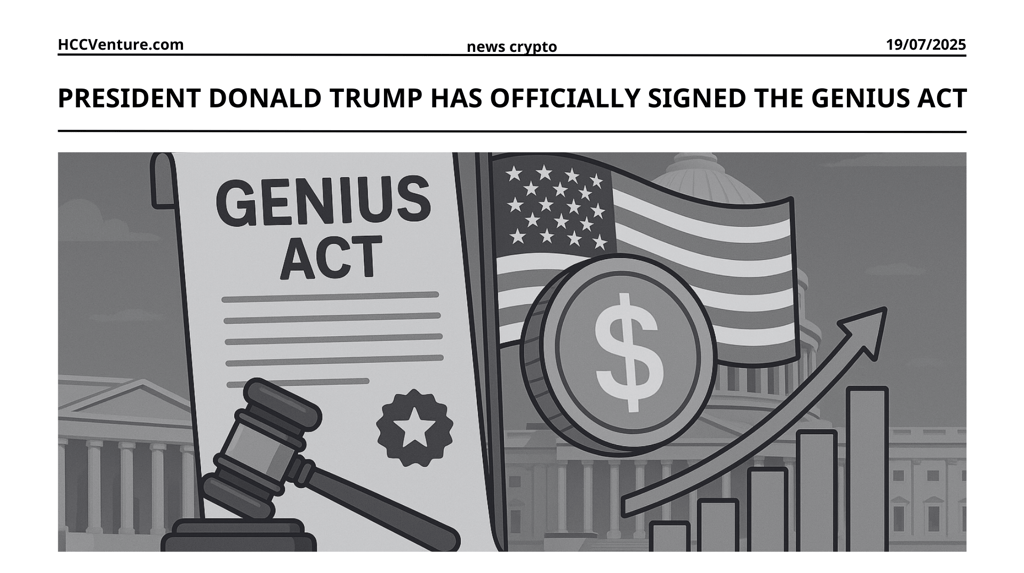President Donald Trump has officially signed the GENIUS Act
GENIUS (Guiding and Establishing National Innovation for US Stablecoins Act) became law, marking the first time stablecoins – cryptocurrencies pegged to the USD or other stable assets – have a clear legal framework in the US.
TIN TỨC
7/19/20253 min read


Basic Information About the GENIUS Act
The GENIUS Act creates a comprehensive regulatory framework for stablecoin payments, focusing on three key elements: issuance, oversight, and consumer protection. First, stablecoins can only be issued by licensed financial institutions. These include certified state institutions, non-bank financial companies approved by the Federal Reserve or the Office of the Comptroller of the Currency. These institutions
must hold reserves of U.S. dollars, short-term Treasury securities, or equivalent assets. They are also required to report monthly transparency reports and be audited annually by public accounting firms. Second, the scope of oversight under the act. States can oversee issuers with less than $10 billion in capital, while larger institutions are overseen by federal agencies like the OCC or the Fed. To ensure that stablecoins are not used for illicit activities, anti-money laundering (AML) regulations and KYC/KYB compliance are also in place.
The bill also prohibits stablecoins from paying interest to users; this is a controversial point but is designed to reduce financial risk. Finally, members of Congress or high-ranking federal officials are prohibited from issuing stablecoins while in office, to protect consumers, and stablecoins must be given priority in the event of bankruptcy. The bill will give institutions a transition period of 18 months from the date of signing or 120 days after the final regulations are issued.
President Trump signs the GENIUS Act
Trump’s signing of the GENIUS Act at the White House, attended by industry leaders such as the CEOs of Robinhood and Tether, was a symbolic event that demonstrated the administration’s commitment to promoting cryptocurrencies. In his speech, Trump called it “the greatest financial technology revolution since the birth of the internet,” emphasizing the potential of stablecoins for instant payments and strengthening the digital dollar.
The event comes after “Crypto Week” in the House, where lawmakers overcame opposition from some conservatives and secured bipartisan support. Trump’s involvement is not only political but also personal, as his family is involved in the USD1 stablecoin through World Liberty Financial. Despite criticism of conflicts of interest, the administration has insisted that Trump’s assets are managed through a trust, and that the bill includes safeguards to prevent officials from taking advantage. The signing event is expected to inspire other legislation, such as the Clarity Act on Cryptocurrency Market Structure, which is expected to be considered by the Senate in late September 2025.
Impact of the GENIUS Act on the Market
The GENIUS Act has both immediate and long-term implications for the cryptocurrency market. Immediately following the signing, Bitcoin rose 1.8% to $120,500, while Ethereum hit $3,450, up 2.3% in 24 hours (data at 5:34 PM +07, 19/7/2025). Leading stablecoins such as USDC ($64 billion in market capitalization) and USDT ($161 billion) also saw a 15% increase in trading volume, reaching $75 billion on the day, reflecting investor optimism. In the short term, the act instills confidence in financial institutions, with banks like JPMorgan Chase and fintech companies like Circle (issuer of USDC) quickly planning to issue new stablecoins.
This could push the stablecoin market capitalization from $260 billion to $500 billion within 12 months, Citigroup predicts. Ripple, with its stablecoin RLUSD ($470 million in market cap), stands to benefit from its early compliance with reserve and transparency requirements. In the long term, however, some analysts warn of centralization risks. Limiting issuance to large financial institutions could eliminate decentralized projects like TerraUSD, which collapsed in 2022, but also reduce innovation in the industry. Additionally, foreign stablecoins like BUSD (issued by Binance) could struggle to comply, leading to a loss of market share in the U.S. unless they are certified as equivalent.
Disclaimer: The information presented in this article is the author's personal opinion on the cryptocurrency field. It is not intended to be financial or investment advice. Any investment decision should be based on careful consideration of your personal portfolio and risk tolerance. The views expressed in the article do not represent the official position of the platform. We recommend that readers conduct their own research and consult with a professional before making any investment decisions.
Compiled and analyzed by HCCVenture
Join HCCVenture here: https://linktr.ee/holdcoincventure
See more latest information :
Explore HCCVenture group
HCCVenture © 2023. All rights reserved.

Connect with us
Popular content
Contact to us
E-mail : sp_contact@hccventure.com
Register : https://linktr.ee/holdcoincventure
Disclaimer: The information on this website is for informational purposes only and should not be considered investment advice. We are not responsible for any risks or losses arising from investment decisions based on the content here.


TERMS AND CONDITIONS • CUSTOMER PROTECTION POLICY
ANALYTICAL AND NEWS CONTENT IS COMPILED AND PROVIDED BY EXPERTS IN THE FIELD OF DIGITAL FINANCE AND BLOCKCHAIN BELONGING TO HCCVENTURE ORGANIZATION, INCLUDING OWNERSHIP OF THE CONTENT.
RESPONSIBLE FOR MANAGING ALL CONTENT AND ANALYSIS: HCCVENTURE FOUNDER - TRUONG MINH HUY
Read warnings about scams and phishing emails — REPORT A PROBLEM WITH OUR SITE.
